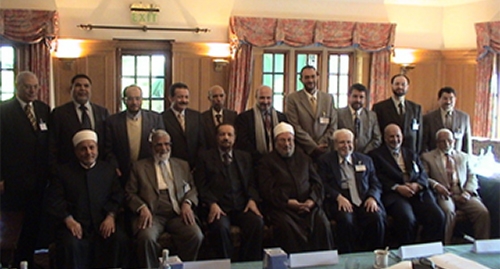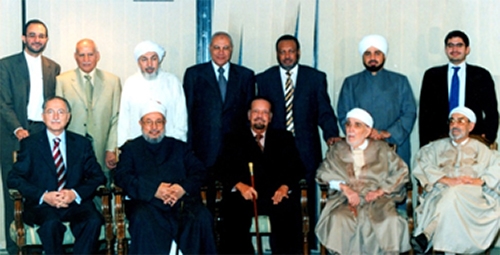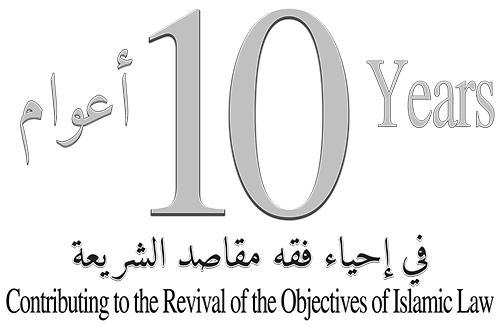“10 Years Contribution to the Revival of the Objectives of Islamic Law”
The study of the philosophy of Islamic law, especially its maqasid (objectives, purposes, goals, intents and underlying principles) is a pre-requisite to understanding the Qurʾan and the prophetic tradition, and to developing Islamic law in a way that achieves common good and protects from harm. For that purpose, Al-Furqan Islamic Heritage Foundation established the Centre for the Study of the Philosophy of Islamic Law. The founding seminar of the Centre took place in March 2005, in London, and included distinguished scholars and dignitaries.

The Centre aims to broaden the horizons and knowledge of students of Islamic studies and encourage studies and research which contribute to the Islamic philosophy of law. It also aims to revitalise the knowledge of maqasid and to expand the scientific and intellectual interest in the philosophy of Islamic Law, in order to specifically broaden the framework of Islamic fiqh and its fundamental theory (usul) and generally to include the other Islamic, social and humanitarian sciences.
It supports new research in the theories of priorities, utility, consequences and universal principles of Islamic law, and calls upon scholars and Islamic institutes of fatwa to illustrate the link between the Islamic texts, fatwas and maqasid.
The Maqasid Centre’s Mission
The Maqasid Centre's mission is to revitalise the knowledge of maqasid, in order to develop the process of ijtihad and the renewal of Islamic fiqh, its fundamental theory (usul), and Islamic thought in general. The Centre also aims to broaden the horizons and knowledge of students of Islamic studies everywhere.
The Maqasid Centre’s Aims and Objectives
- Encouraging studies and research which contribute to the Islamic philosophy of law, inside and outside the academic world
- Co-operating with Islamic universities and Islamic studies' departments in order to include maqasid in their curricula or syllabi
- Calling upon scholars to elaborate on the correlation between contemporary ijtihad and maqasid, so as to facilitate understanding the wisdom behind, and objectives of, Islamic rulings
- Giving special consideration to new research in the theories of priorities, utility, consequences and universal principles of Islamic law
- Calling upon scholars and Islamic institutes of fatwa to illustrate the link between the Islamic texts, fatwa and maqasid
- Refuting attempts to misuse the idea of maqasid in order to “deconstruct” the Islamic principles and fundamentals
- Promoting and publishing biographies of scholars who have contributed to the study of maqasid
- Incorporating maqasid theories in the methodology and philosophy of various social sciences and humanities
- Reinforcing the link between the study of maqasid and the study of the basic rules of the Islamic law
- Establishing a comprehensive maqasid encyclopaedia.
To achieve its aims and objectives, the Centre pursues the following activities:
· Publishing new critical editions of maqasid books of particular significance
· Publishing bibliographical references in the field of maqasid
· Publishing studies on maqasid of Islamic law
· Organising training courses on understanding maqasid
· Holding conferences, symposia, seminars and lectures to stimulate research and discussions on topics related to the field of maqasid
· Establishing a reference library with the main research tools necessary for the study of maqasid (philosophy of Islamic jurisprudence)
· Encouraging Islamic studies' departments and programmes outside traditional Islamic institutes, to conduct research that shows the universality of Islamic law in all cultural contexts
· Encouraging versatile students and young researchers to study the philosophy of Islamic law, maqasid
The Maqasid Centre’s Boards
The International Advisory Board
The International Advisory Board includes a distinguished group of scholars and researchers in different fields of Islamic studies.
The International Advisory Board has a legislative status, with a role to:
- Define the Maqasid Centre’s policies, goals and strategies
- Establish guidelines for the Centre’s fields of activities
- Issue decisions regarding the amendments or addition to the Centre’s policies, regulations and activities

The Board of Experts
The Board of Experts includes a distinguished group of scholars and researchers in different fields of Islamic studies.
The Board of Experts is a decision-making body, with a role to:
- Review the activities of the Maqasid Centre on a yearly basis and provide the appropriate directions
- Elaborate on and discuss themes for projects to be adopted by the Centre on a yearly basis
- Inspect projects and scholarly works submitted to the Centre for financing and publishing, and issue decisions as to its acceptance, request for modifications, or rejection
The Maqasid Centre’s Activities
The most important events and activities carried out by the Centre are:
- Training courses
- Conferences
- Lectures
- Editing manuscripts written in fields related to Maqasid
- Publication of research in the field
Training Courses
The Centre has so far organised 11 training courses, on the following topics:
· “Purposes of the Islamic Law and Contemporary Issues”
· “Purposes of the Islamic Financial Law”
· “The Objectives of Islamic Law and the Provisions of the Family in Islam”
· “Purposes of Islamic Law and Legal Science”
· “The Objectives of Sharīʿah in al-Tāhir bin Ashūr’s Thoughts”
· “Purposes of the Sharīʿah in the Schools of Islamic Law”
· “The Objectives of Sharīʿah and the International Conventions”
· “The Objectives of Sharīʿah: the Principles and Concepts”
· “Applying the Sharīʿah Objectives Between Fear and Leniency”
· “Objectives of the Noble Qurʾan”
· “Applying the Objectives of Islamic Law (Maqasid) in the Da‘wah Sphere”
Symposia
The Centre has so far organised 5 symposia, on the following topics:
· “Studies in the Philosophy of Islamic Law; Theory and Applications”
· “Purposes and Reasoning in the Islamic Law”
· “The Objectives of Arts in Islam”
· “The Activation of the Objectives of Sharīʿah in the Political Sphere”
· “Towards a Unified Islamic Perspective on Issues Related to Women and Population”
Conferences
- “The State between Tradition and Future”
- “The State and the Society in the Scope of the Objectives of Sharīʿah”
Lectures
- “The Role of the Purposes of Islamic Law in Contemporary Legislation”, byProfessor Mohammad Salim al-Awwa
- “The Relationship Between Purposes (Maqasid) and Fundamentals (Usul) of Islamic Law”, by Sheikh Abdullah bin Bayyah
- “Objectives of the Pilgrimage Rites”, by Professor Abdul-Wahhab Abu Sulaiman
- “Universal Purposes of the Islamic Law and Exegesis Methodologies”,by Professor Hassan Jabir
- “Purposes of Tacit Juridical Evidence”, by Professor Mohammad Salim al-Awwa
- “Purposes of the Islamic Financial Law”, by Sheikh Abdullah bin Bayyah
- “Purposes of Islamic Voluntary Work – A Comparative Study of Civility”, by Dr Ibrahim al-Bayoumi Ghanem
- “The importance of Renewal of Islamic Thought and the Primary Means Towards It”, by H.E. Sheikh Ahmed Zaki Yamani
- “Purposes of Islamic Law & its Bibliography”, by Professor Mohammad Kamal Imam
- “The Public Interest in the Term of the Purposes of Islamic Law – a Functional Vision”, by Professor Mohammad Kamal Imam
- “Omission in Legislation and Obligation”, by Professor Abdul-Wahhab Abu Sulaiman
- “Consequences of Acts in the Term of the Purposes of Islamic Law”, by Professor Mohammad Kamal Imam
- “The Purposes of Good and the Jurisprudence of Public Interest”, by Dr Ibrahim al-Bayoumi Ghanem
- “The Objectives of Fasting: Reflections on the Meaning”, by Professor Heba Raouf Ezzat
Publications
The Centre works in spreading the idea of maqasid (objectives of Sharīʿa) through seminars, lectures and training courses, as well as through publication of books that deal with the philosophy of Islamic law.
To date, it has published more than thirty titles, covering a wide range of topics and different subjects.
Bibliography for Maqasid al-Sharīʿah (Al-Daleel al-Irshadi ila al-Maqasid al-Sharīʿah)
The Bibliography for Maqāṣid al-Sharīʿah (Al-Daleel al-Irshadi ila al-Maqasid al-Sharīʿah) is a comprehensive reference work and a historical record of what has been written in the field of the Sharīʿah objectives. It is also a library tool which brings together the scattered intellectual production in this field. This study, supervised by Dr. Mohamed Kamal Imam, made a survey of all that has been produced in this field from the 3rd century A.H. till today. The study covers all the Islamic schools of thought and includes sources such as manuscripts, theses, conferences and modern studies found in a number of countries and in their languages.
This encyclopaedic work consists of 10 volumes,providing references and abstracts of about 2,000 titles.


